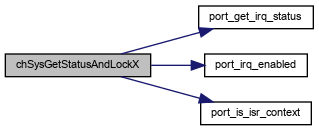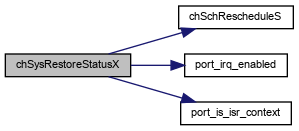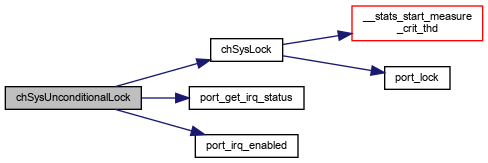
Detailed Description
System related APIs and services:
- Initialization.
- Locks.
- Interrupt Handling.
- Power Management.
- Abnormal Termination.
- Realtime counter.
Macros | |
| #define | CH_SYS_CORE0_MEMORY PORT_CORE0_BSS_SECTION |
| Core zero memory affinity macro. More... | |
| #define | CH_SYS_CORE1_MEMORY PORT_CORE1_BSS_SECTION |
| Core one memory affinity macro. More... | |
| #define | currcore ch_system.instances[port_get_core_id()] |
| Access to current core's instance structure. More... | |
| #define | chSysGetRealtimeCounterX() (rtcnt_t)port_rt_get_counter_value() |
| Returns the current value of the system real time counter. More... | |
| #define | chSysSwitch(ntp, otp) |
| Performs a context switch. More... | |
Masks of executable integrity checks. | |
| #define | CH_INTEGRITY_RLIST 1U |
| #define | CH_INTEGRITY_VTLIST 2U |
| #define | CH_INTEGRITY_REGISTRY 4U |
| #define | CH_INTEGRITY_PORT 8U |
ISRs abstraction macros | |
| #define | CH_IRQ_IS_VALID_PRIORITY(prio) PORT_IRQ_IS_VALID_PRIORITY(prio) |
| Priority level validation macro. More... | |
| #define | CH_IRQ_IS_VALID_KERNEL_PRIORITY(prio) PORT_IRQ_IS_VALID_KERNEL_PRIORITY(prio) |
| Priority level validation macro. More... | |
| #define | CH_IRQ_PROLOGUE() |
| IRQ handler enter code. More... | |
| #define | CH_IRQ_EPILOGUE() |
| IRQ handler exit code. More... | |
| #define | CH_IRQ_HANDLER(id) PORT_IRQ_HANDLER(id) |
| Standard normal IRQ handler declaration. More... | |
Fast ISRs abstraction macros | |
| #define | CH_FAST_IRQ_HANDLER(id) PORT_FAST_IRQ_HANDLER(id) |
| Standard fast IRQ handler declaration. More... | |
Time conversion utilities for the realtime counter | |
| #define | S2RTC(freq, sec) ((freq) * (sec)) |
| Seconds to realtime counter. More... | |
| #define | MS2RTC(freq, msec) (rtcnt_t)((((freq) + 999UL) / 1000UL) * (msec)) |
| Milliseconds to realtime counter. More... | |
| #define | US2RTC(freq, usec) (rtcnt_t)((((freq) + 999999UL) / 1000000UL) * (usec)) |
| Microseconds to realtime counter. More... | |
| #define | RTC2S(freq, n) ((((n) - 1UL) / (freq)) + 1UL) |
| Realtime counter cycles to seconds. More... | |
| #define | RTC2MS(freq, n) ((((n) - 1UL) / ((freq) / 1000UL)) + 1UL) |
| Realtime counter cycles to milliseconds. More... | |
| #define | RTC2US(freq, n) ((((n) - 1UL) / ((freq) / 1000000UL)) + 1UL) |
| Realtime counter cycles to microseconds. More... | |
Functions | |
| static CH_SYS_CORE0_MEMORY | THD_WORKING_AREA (ch_c0_idle_thread_wa, PORT_IDLE_THREAD_STACK_SIZE) |
| Working area for core 0 idle thread. More... | |
| static CH_SYS_CORE1_MEMORY | THD_WORKING_AREA (ch_c1_idle_thread_wa, PORT_IDLE_THREAD_STACK_SIZE) |
| Working area for core 1 idle thread. More... | |
| void | chSysWaitSystemState (system_state_t state) |
| Waits for the system state to be equal to the specified one. More... | |
| void | chSysInit (void) |
| System initialization. More... | |
| void | chSysHalt (const char *reason) |
| Halts the system. More... | |
| bool | chSysIntegrityCheckI (unsigned testmask) |
| System integrity check. More... | |
| void | chSysTimerHandlerI (void) |
| Handles time ticks for round robin preemption and timer increments. More... | |
| syssts_t | chSysGetStatusAndLockX (void) |
| Returns the execution status and enters a critical zone. More... | |
| void | chSysRestoreStatusX (syssts_t sts) |
| Restores the specified execution status and leaves a critical zone. More... | |
| bool | chSysIsCounterWithinX (rtcnt_t cnt, rtcnt_t start, rtcnt_t end) |
| Realtime window test. More... | |
| void | chSysPolledDelayX (rtcnt_t cycles) |
| Polled delay. More... | |
| static void | chSysDisable (void) |
| Raises the system interrupt priority mask to the maximum level. More... | |
| static void | chSysSuspend (void) |
| Raises the system interrupt priority mask to system level. More... | |
| static void | chSysEnable (void) |
| Lowers the system interrupt priority mask to user level. More... | |
| static void | chSysLock (void) |
| Enters the kernel lock state. More... | |
| static void | chSysUnlock (void) |
| Leaves the kernel lock state. More... | |
| static void | chSysLockFromISR (void) |
| Enters the kernel lock state from within an interrupt handler. More... | |
| static void | chSysUnlockFromISR (void) |
| Leaves the kernel lock state from within an interrupt handler. More... | |
| static void | chSysUnconditionalLock (void) |
| Unconditionally enters the kernel lock state. More... | |
| static void | chSysUnconditionalUnlock (void) |
| Unconditionally leaves the kernel lock state. More... | |
| static void | chSysNotifyInstance (os_instance_t *oip) |
| Notifies an OS instance to check for reschedule. More... | |
| static thread_t * | chSysGetIdleThreadX (void) |
| Returns a pointer to the idle thread. More... | |
Variables | |
| ch_system_t | ch_system |
| System root object. More... | |
| CH_SYS_CORE0_MEMORY os_instance_t | ch0 |
| Core 0 OS instance. More... | |
| const os_instance_config_t | ch_core0_cfg |
| Core 0 OS instance configuration. More... | |
| CH_SYS_CORE1_MEMORY os_instance_t | ch1 |
| Core 1 OS instance. More... | |
| const os_instance_config_t | ch_core1_cfg |
| Core 1 OS instance configuration. More... | |
Macro Definition Documentation
◆ CH_SYS_CORE0_MEMORY
| #define CH_SYS_CORE0_MEMORY PORT_CORE0_BSS_SECTION |
◆ CH_SYS_CORE1_MEMORY
| #define CH_SYS_CORE1_MEMORY PORT_CORE1_BSS_SECTION |
◆ currcore
| #define currcore ch_system.instances[port_get_core_id()] |
◆ CH_IRQ_IS_VALID_PRIORITY
| #define CH_IRQ_IS_VALID_PRIORITY | ( | prio | ) | PORT_IRQ_IS_VALID_PRIORITY(prio) |
Priority level validation macro.
This macro determines if the passed value is a valid priority level for the underlying architecture.
- Parameters
-
[in] prio the priority level
- Returns
- Priority range result.
- Return values
-
false if the priority is invalid or if the architecture does not support priorities. true if the priority is valid.
◆ CH_IRQ_IS_VALID_KERNEL_PRIORITY
| #define CH_IRQ_IS_VALID_KERNEL_PRIORITY | ( | prio | ) | PORT_IRQ_IS_VALID_KERNEL_PRIORITY(prio) |
Priority level validation macro.
This macro determines if the passed value is a valid priority level that cannot preempt the kernel critical zone.
- Parameters
-
[in] prio the priority level
- Returns
- Priority range result.
- Return values
-
false if the priority is invalid or if the architecture does not support priorities. true if the priority is valid.
◆ CH_IRQ_PROLOGUE
| #define CH_IRQ_PROLOGUE | ( | ) |
IRQ handler enter code.
- Note
- Usually IRQ handlers functions are also declared naked.
- On some architectures this macro can be empty.
- Function Class:
- Special function, this function has special requirements see the notes.
◆ CH_IRQ_EPILOGUE
| #define CH_IRQ_EPILOGUE | ( | ) |
IRQ handler exit code.
- Note
- Usually IRQ handlers function are also declared naked.
-
This macro usually performs the final reschedule by using
chSchIsPreemptionRequired()andchSchDoReschedule().
- Function Class:
- Special function, this function has special requirements see the notes.
◆ CH_IRQ_HANDLER
| #define CH_IRQ_HANDLER | ( | id | ) | PORT_IRQ_HANDLER(id) |
◆ CH_FAST_IRQ_HANDLER
| #define CH_FAST_IRQ_HANDLER | ( | id | ) | PORT_FAST_IRQ_HANDLER(id) |
◆ S2RTC
| #define S2RTC | ( | freq, | |
| sec | |||
| ) | ((freq) * (sec)) |
Seconds to realtime counter.
Converts from seconds to realtime counter cycles.
- Note
- The macro assumes that
freq>=1.
- Parameters
-
[in] freq clock frequency, in Hz, of the realtime counter [in] sec number of seconds
- Returns
- The number of cycles.
- Function Class:
- Normal API, this function can be invoked by regular system threads but not from within a lock zone.
◆ MS2RTC
| #define MS2RTC | ( | freq, | |
| msec | |||
| ) | (rtcnt_t)((((freq) + 999UL) / 1000UL) * (msec)) |
Milliseconds to realtime counter.
Converts from milliseconds to realtime counter cycles.
- Note
- The result is rounded upward to the next millisecond boundary.
-
The macro assumes that
freq>=1000.
- Parameters
-
[in] freq clock frequency, in Hz, of the realtime counter [in] msec number of milliseconds
- Returns
- The number of cycles.
- Function Class:
- Normal API, this function can be invoked by regular system threads but not from within a lock zone.
◆ US2RTC
| #define US2RTC | ( | freq, | |
| usec | |||
| ) | (rtcnt_t)((((freq) + 999999UL) / 1000000UL) * (usec)) |
Microseconds to realtime counter.
Converts from microseconds to realtime counter cycles.
- Note
- The result is rounded upward to the next microsecond boundary.
-
The macro assumes that
freq>=1000000.
- Parameters
-
[in] freq clock frequency, in Hz, of the realtime counter [in] usec number of microseconds
- Returns
- The number of cycles.
- Function Class:
- Normal API, this function can be invoked by regular system threads but not from within a lock zone.
◆ RTC2S
| #define RTC2S | ( | freq, | |
| n | |||
| ) | ((((n) - 1UL) / (freq)) + 1UL) |
Realtime counter cycles to seconds.
Converts from realtime counter cycles number to seconds.
- Note
- The result is rounded up to the next second boundary.
-
The macro assumes that
freq>=1.
- Parameters
-
[in] freq clock frequency, in Hz, of the realtime counter [in] n number of cycles
- Returns
- The number of seconds.
- Function Class:
- Normal API, this function can be invoked by regular system threads but not from within a lock zone.
◆ RTC2MS
| #define RTC2MS | ( | freq, | |
| n | |||
| ) | ((((n) - 1UL) / ((freq) / 1000UL)) + 1UL) |
Realtime counter cycles to milliseconds.
Converts from realtime counter cycles number to milliseconds.
- Note
- The result is rounded up to the next millisecond boundary.
-
The macro assumes that
freq>=1000.
- Parameters
-
[in] freq clock frequency, in Hz, of the realtime counter [in] n number of cycles
- Returns
- The number of milliseconds.
- Function Class:
- Normal API, this function can be invoked by regular system threads but not from within a lock zone.
◆ RTC2US
| #define RTC2US | ( | freq, | |
| n | |||
| ) | ((((n) - 1UL) / ((freq) / 1000000UL)) + 1UL) |
Realtime counter cycles to microseconds.
Converts from realtime counter cycles number to microseconds.
- Note
- The result is rounded up to the next microsecond boundary.
-
The macro assumes that
freq>=1000000.
- Parameters
-
[in] freq clock frequency, in Hz, of the realtime counter [in] n number of cycles
- Returns
- The number of microseconds.
- Function Class:
- Normal API, this function can be invoked by regular system threads but not from within a lock zone.
◆ chSysGetRealtimeCounterX
| #define chSysGetRealtimeCounterX | ( | ) | (rtcnt_t)port_rt_get_counter_value() |
Returns the current value of the system real time counter.
- Note
- This function is only available if the port layer supports the option
PORT_SUPPORTS_RT.
- Returns
- The value of the system realtime counter of type rtcnt_t.
- Function Class:
- This is an X-Class API, this function can be invoked from any context.
◆ chSysSwitch
| #define chSysSwitch | ( | ntp, | |
| otp | |||
| ) |
Performs a context switch.
- Note
- Not a user function, it is meant to be invoked by the scheduler itself or from within the port layer.
- Parameters
-
[in] ntp the thread to be switched in [in] otp the thread to be switched out
- Function Class:
- Special function, this function has special requirements see the notes.
Function Documentation
◆ THD_WORKING_AREA() [1/2]
|
static |
Working area for core 0 idle thread.
◆ THD_WORKING_AREA() [2/2]
|
static |
Working area for core 1 idle thread.
◆ chSysWaitSystemState()
| void chSysWaitSystemState | ( | system_state_t | state | ) |
Waits for the system state to be equal to the specified one.
- Note
- Can be called before
chSchObjectInit()in order to wait for system initialization by another core.
- Function Class:
- Special function, this function has special requirements see the notes.
Definition at line 142 of file chsys.c.
References ch_system::state.
◆ chSysInit()
| void chSysInit | ( | void | ) |
System initialization.
After executing this function the current instructions stream becomes the main thread.
- Precondition
- Interrupts must disabled before invoking this function.
- Postcondition
- The main thread is created with priority
NORMALPRIOand interrupts are enabled. -
the system is in
ch_sys_runningstate.
- Function Class:
- Special function, this function has special requirements see the notes.
Definition at line 159 of file chsys.c.
References ch_system::state.
◆ chSysHalt()
| void chSysHalt | ( | const char * | reason | ) |
Halts the system.
This function is invoked by the operating system when an unrecoverable error is detected, for example because a programming error in the application code that triggers an assertion while in debug mode.
- Note
- Can be invoked from any system state.
- Parameters
-
[in] reason pointer to an error string
- Function Class:
- Special function, this function has special requirements see the notes.
Definition at line 209 of file chsys.c.
Referenced by __dbg_check_disable(), __dbg_check_enable(), __dbg_check_enter_isr(), __dbg_check_leave_isr(), __dbg_check_lock(), __dbg_check_lock_from_isr(), __dbg_check_suspend(), __dbg_check_unlock(), __dbg_check_unlock_from_isr(), chDbgCheckClassI(), and chDbgCheckClassS().
◆ chSysIntegrityCheckI()
| bool chSysIntegrityCheckI | ( | unsigned | testmask | ) |
System integrity check.
Performs an integrity check of the important ChibiOS/RT data structures.
- Note
- The appropriate action in case of failure is to halt the system before releasing the critical zone.
-
If the system is corrupted then one possible outcome of this function is an exception caused by
NULLor corrupted pointers in list elements. Exception vectors must be monitored as well. - This function is not used internally, it is up to the application to define if and where to perform system checking.
- Performing all tests at once can be a slow operation and can degrade the system response time. It is suggested to execute one test at time and release the critical zone in between tests.
- Parameters
-
[in] testmask Each bit in this mask is associated to a test to be performed.
- Returns
- The test result.
- Return values
-
false The test succeeded. true Test failed.
- Function Class:
- This is an I-Class API, this function can be invoked from within a system lock zone by both threads and interrupt handlers.
Definition at line 260 of file chsys.c.
References currcore.
◆ chSysTimerHandlerI()
| void chSysTimerHandlerI | ( | void | ) |
Handles time ticks for round robin preemption and timer increments.
Decrements the remaining time quantum of the running thread and preempts it when the quantum is used up. Increments system time and manages the timers.
- Note
- The frequency of the timer determines the system tick granularity and, together with the
CH_CFG_TIME_QUANTUMmacro, the round robin interval.
- Function Class:
- This is an I-Class API, this function can be invoked from within a system lock zone by both threads and interrupt handlers.
Definition at line 366 of file chsys.c.
References chThdGetSelfX.
◆ chSysGetStatusAndLockX()
| syssts_t chSysGetStatusAndLockX | ( | void | ) |
Returns the execution status and enters a critical zone.
This functions enters into a critical zone and can be called from any context. Because its flexibility it is less efficient than chSysLock() which is preferable when the calling context is known.
- Postcondition
- The system is in a critical zone.
- Returns
- The previous system status, the encoding of this status word is architecture-dependent and opaque.
- Function Class:
- This is an X-Class API, this function can be invoked from any context.
Definition at line 400 of file chsys.c.
References chSysLock, chSysLockFromISR, port_get_irq_status(), port_irq_enabled(), and port_is_isr_context().

◆ chSysRestoreStatusX()
| void chSysRestoreStatusX | ( | syssts_t | sts | ) |
Restores the specified execution status and leaves a critical zone.
- Note
- A call to
chSchRescheduleS()is automatically performed if exiting the critical zone and if not in ISR context.
- Parameters
-
[in] sts the system status to be restored.
- Function Class:
- This is an X-Class API, this function can be invoked from any context.
Definition at line 423 of file chsys.c.
References chSchRescheduleS(), chSysUnlock, chSysUnlockFromISR, port_irq_enabled(), and port_is_isr_context().

◆ chSysIsCounterWithinX()
Realtime window test.
This function verifies if the current realtime counter value lies within the specified range or not. The test takes care of the realtime counter wrapping to zero on overflow.
- Note
- When start==end then the function returns always false because a null time range is specified.
-
This function is only available if the port layer supports the option
PORT_SUPPORTS_RT.
- Parameters
-
[in] cnt the counter value to be tested [in] start the start of the time window (inclusive) [in] end the end of the time window (non inclusive)
- Return values
-
true current time within the specified time window. false current time not within the specified time window.
- Function Class:
- This is an X-Class API, this function can be invoked from any context.
Definition at line 455 of file chsys.c.
Referenced by chSysPolledDelayX().
◆ chSysPolledDelayX()
| void chSysPolledDelayX | ( | rtcnt_t | cycles | ) |
Polled delay.
- Note
- The real delay is always few cycles in excess of the specified value.
-
This function is only available if the port layer supports the option
PORT_SUPPORTS_RT.
- Parameters
-
[in] cycles number of cycles
- Function Class:
- This is an X-Class API, this function can be invoked from any context.
Definition at line 472 of file chsys.c.
References chSysGetRealtimeCounterX, and chSysIsCounterWithinX().

◆ chSysDisable()
|
inlinestatic |
Raises the system interrupt priority mask to the maximum level.
All the maskable interrupt sources are disabled regardless their hardware priority.
- Note
- Do not invoke this API from within a kernel lock.
-
This API is no replacement for
chSysLock()andchSysUnock()which could do more than just disable interrupts.
- Function Class:
- Special function, this function has special requirements see the notes.
Definition at line 361 of file chsys.h.
References port_disable().

◆ chSysSuspend()
|
inlinestatic |
Raises the system interrupt priority mask to system level.
The interrupt sources that should not be able to preempt the kernel are disabled, interrupt sources with higher priority are still enabled.
- Note
- Do not invoke this API from within a kernel lock.
-
This API is no replacement for
chSysLock()which could do more than just disable interrupts.
- Function Class:
- Special function, this function has special requirements see the notes.
Definition at line 378 of file chsys.h.
References port_suspend().

◆ chSysEnable()
|
inlinestatic |
Lowers the system interrupt priority mask to user level.
All the interrupt sources are enabled.
- Note
- Do not invoke this API from within a kernel lock.
-
This API is no replacement for
chSysUnlock()which could do more than just enable interrupts.
- Function Class:
- Special function, this function has special requirements see the notes.
◆ chSysLock()
|
inlinestatic |
Enters the kernel lock state.
- Note
- The exact behavior of this function is port-dependent and could not be limited to disabling interrupts.
- Function Class:
- Special function, this function has special requirements see the notes.
Definition at line 406 of file chsys.h.
References __stats_start_measure_crit_thd(), and port_lock().
Referenced by chSysUnconditionalLock().

◆ chSysUnlock()
|
inlinestatic |
Leaves the kernel lock state.
- Note
- The exact behavior of this function is port-dependent and could not be limited to enabling interrupts.
- Function Class:
- Special function, this function has special requirements see the notes.
Definition at line 420 of file chsys.h.
Referenced by chSysUnconditionalUnlock().
◆ chSysLockFromISR()
|
inlinestatic |
Enters the kernel lock state from within an interrupt handler.
- Note
- This API may do nothing on some architectures, it is required because on ports that support preemptable interrupt handlers it is required to raise the interrupt mask to the same level of the system mutual exclusion zone.
It is good practice to invoke this API before invoking any I-class syscall from an interrupt handler. - The exact behavior of this function is port-dependent and could not be limited to disabling interrupts.
- This API must be invoked exclusively from interrupt handlers.
- Function Class:
- Special function, this function has special requirements see the notes.
Definition at line 450 of file chsys.h.
References __stats_start_measure_crit_isr(), and port_lock_from_isr().

◆ chSysUnlockFromISR()
|
inlinestatic |
Leaves the kernel lock state from within an interrupt handler.
- Note
- This API may do nothing on some architectures, it is required because on ports that support preemptable interrupt handlers it is required to raise the interrupt mask to the same level of the system mutual exclusion zone.
It is good practice to invoke this API after invoking any I-class syscall from an interrupt handler. - The exact behavior of this function is port-dependent and could not be limited to enabling interrupts.
- This API must be invoked exclusively from interrupt handlers.
- Function Class:
- Special function, this function has special requirements see the notes.
◆ chSysUnconditionalLock()
|
inlinestatic |
Unconditionally enters the kernel lock state.
- Note
- Can be called without previous knowledge of the current lock state. The final state is "s-locked".
- Function Class:
- Special function, this function has special requirements see the notes.
Definition at line 486 of file chsys.h.
References chSysLock(), port_get_irq_status(), and port_irq_enabled().

◆ chSysUnconditionalUnlock()
|
inlinestatic |
Unconditionally leaves the kernel lock state.
- Note
- Can be called without previous knowledge of the current lock state. The final state is "normal".
- Function Class:
- Special function, this function has special requirements see the notes.
Definition at line 500 of file chsys.h.
References chSysUnlock(), port_get_irq_status(), and port_irq_enabled().

◆ chSysNotifyInstance()
|
inlinestatic |
◆ chSysGetIdleThreadX()
|
inlinestatic |
Returns a pointer to the idle thread.
- Precondition
- In order to use this function the option
CH_CFG_NO_IDLE_THREADmust be disabled.
- Note
- The reference counter of the idle thread is not incremented but it is not strictly required being the idle thread a static object.
- Returns
- Pointer to the idle thread.
- Function Class:
- This is an X-Class API, this function can be invoked from any context.
Definition at line 534 of file chsys.h.
References currcore.
Variable Documentation
◆ ch_system
◆ ch0
◆ ch_core0_cfg
| const os_instance_config_t ch_core0_cfg |
Core 0 OS instance configuration.
◆ ch1
◆ ch_core1_cfg
| const os_instance_config_t ch_core1_cfg |
Core 1 OS instance configuration.
